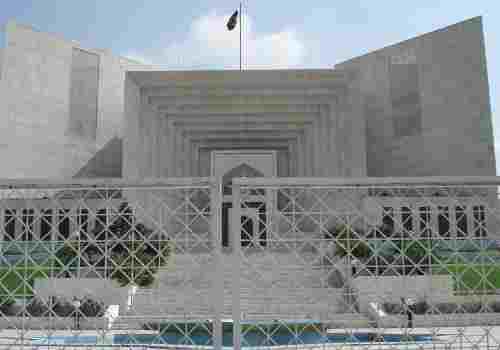ISLAMABAD: The Supreme Court (SC) of Pakistan, on Wednesday, dismissed the government’s fact-finding committee and directed Attorney-General for Pakistan, Mansoor Usman Awan, to form a fresh inquiry commission to oversee the execution of the apex court’s decision in the Faizabad sit-in case.
The government formed the fact-finding committee on Friday to investigate the “role and directions” of all “concerned” officials in the management and handling of the 2017 sit-in staged by Tehreek-e-Labbaik Pakistan against the then-Pakistan Muslim League-Nawaz (PML-N) government.
The decision for a new inquiry commission was made during the hearing of a set of petitions challenging the February 6, 2019, judgment in the Faizabad dharna case.
On February 6, 2019, the Supreme Court bench, including the current Chief Justice of Pakistan (CJP) Qazi Faez Isa and Justice Mushir Alam, ruled that intelligence agencies should not exceed their respective mandates.
Numerous pleas challenging the Supreme Court’s verdict on the Faizabad sit-in were filed by the federal government, Ministry of Defence, the Pakistan Electronic Media Regulatory Authority (Pemra), the Intelligence Bureau (IB), the Election Commission of Pakistan (ECP), Pakistan Tehreek-Insaf (PTI), and others.
However, most of the petitioners recently withdrew their applications, prompting CJP Isa to question, “Why is everyone so afraid to speak the truth?”
The court rejected review pleas filed by the IB, PTI, the defense ministry, MQM, and Ijazul Haq. It also issued notices to Sheikh Rashid for failing to appear in court and adjourned the hearing until November 15.
During today’s hearing, a three-member Supreme Court bench consisting of CJP Isa, Justice Aminuddin Khan, and Justice Athar Minallah heard the petitions challenging the ruling.
The chief justice expressed annoyance over the decision not being implemented since its issuance in 2019 and questioned what the current government was doing regarding the implementation of the Supreme Court’s decision in the sit-in case.
CJP Isa criticized the government’s non-seriousness towards the case and stated that the court would close the case if the government requested it to do so. He expressed concerns about potential future incidents like the Faizabad sit-in and raised questions about the country’s vulnerability to external and internal threats.
CJP Isa’s remarks seemed to allude to Pakistan Awami Tehreek (PAT) chief Tahirul Qadri’s involvement in the 2014 sit-in by Pakistan Tehreek-e-Insaf (PTI) against the then-government of the Pakistan Muslim League-Nawaz (PML-N) in the center. He questioned whether the purpose of importing a person to overthrow the government at that time and whether the said person’s services would be sought again in the future. CJP Isa also raised questions about the person’s travel expenses.
Furthermore, he remarked that Pakistan Electronic Media Regulatory Authority (Pemra) and the Election Commission of Pakistan were not independent at that time.
The court promptly summoned Pemra Chairman Salim Baig during the hearing. Pemra’s counsel stated that he had only received an affidavit from ex-Pemra chairman Absar Alam, who accused Major General Faiz Hamid and his subordinates of controlling the “TV Channel policy” through “unlawful means.”
The Supreme Court had previously requested fresh disclosures from anyone affected by the protest to provide new information in writing on the last hearing.
(Islamabad51_Newsdesk)














